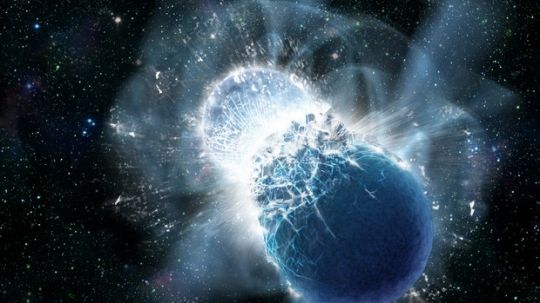When he was considering white dwarfs and neutron stars in the context of what he called ‘gravitational machines,’ Freeman Dyson became intrigued by the fate of a neutron star binary. He calculated in his paper of the same name (citation below) that gradual loss of energy through gravitational radiation would bring the two neutron stars together, creating a gravitational wave event of the sort that has since been observed. Long before LIGO, Dyson was talking about gravitational wave detection instruments that could track the ‘gravitational flash.’
Image: Artist conception of the moment two neutron stars collide. Credit: LIGO / Caltech / MIT.
Read more
